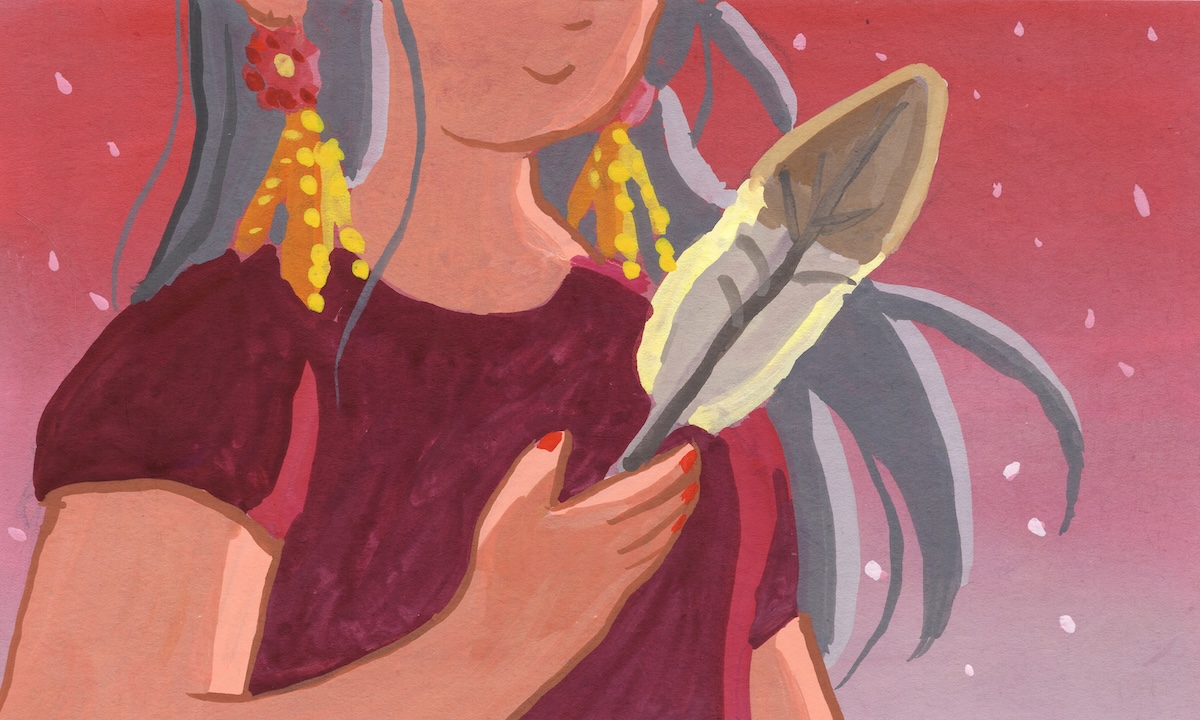From Defense to the Arts: Why Jillian Morris Switched Direction on her Life Path
“You’ve got to trust yourself and find that walk that allows you to carry your gifts while also honoring who you are,” says Jillian Morris. She is Mohawk and a member of Turtle Clan from Six Nations reserve. Her parents moved away from the reserve and they lived all over. She was born in Calgary and their family moved to Ontario where her dad worked for the Ontario Provincial Police force. They moved back to the reserve when she was twelve and stayed there until she graduated. She ended up in Collingwood, Ontario, where she now lives.
Morris had a daughter at 19 years old so she decided to get a post secondary education to support her child. She got a two-year business diploma and went to work for the Department of National Defense for 13 years. She later upgraded to a bachelor's degree through a partnership between First Nations Technical Institute and Ryerson University, learning about public administration and Indigenous governance. She grew to understand the true impacts of colonization and that drew her into the arts. In 2019, she left the department to go into the arts full time. The influence of the First Nations Technical Institute on her was profound, listening to leadership coming from an Indigenous perspective.
Her advice for students leaving home to pursue their education would be to do research around what supports are available where they are going, whether that’s Friendship Centres or other community resources. “Building a support system before you even get there, I think, is going to help encourage that success even more, because it is daunting to leave your family and all the people who know you so well and understand your needs and things like that, and going to an unknown is always scary,” Morris encourages. She recommends doing some legwork to set up supports before making a big move.
“Trust that Creator knew that you had things to offer”
When it comes to overcoming obstacles, Morris says, “this is where I think we are very lucky, especially those of us who have had access to our traditional stories. Growing up, the amount of wisdom that is carried in our stories is just so incredible….. I think if you cling on to those stories all through your travels, I think you're going to be okay.” She recommends filtering decisionmaking through those stories and to lean into their guidance through loneliness and fear. “Nobody can take those stories from you,” she affirms. One of the messages she received from an elder about obstacles was that she had to actually face an obstacle and stop avoiding it and then it would finally be in her past instead of continually recurring.

If Morris could give a message to her younger self it would be, “You've got to put into the world what you want to receive from the world.” At the same time, she recognized that she was stubborn and likely was told what she needed to hear but wasn’t ready to receive or implement those lessons just yet.
When it comes to maintaining her mental health, Morris uses her art and poetry to get her thoughts and feelings out. She sees storytelling as a way to release energy and dark thoughts as a poet or lyricist. “We all have these things that are going on inside of us so it's okay,” she affirms. Being physically active is another way she stays mentally well, since she grew up playing sports. “The mental health aspect of it is huge, even bigger, I think, than the physical aspect,” she shares. Being out in nature is something else she finds helpful as well as relationships with other people. “We know none of us are doing this alone, right? We have to remember that, too,” she emphasizes.
Morris self-published a poetry book, a process she describes as a “journey” but one that was worthwhile in the end and a lot of fun. It was also a lot of work. As far as what she reads herself, she loves Richard Wagamese’s work as well as E. Pauline Johnson. Beyond Johnson’s talent, she says, “I think she was just a representation of our ability and resilience as Indigenous people to make it through all kinds of really hard, hard stuff.”
Understanding colonization better drew Jillian Morris into the arts and away from her career in National Defense. Profoundly touched by the voices of Indigenous leadership she encountered in her bachelor’s degree program, her life took a different path. Knowing she has to give what she wants to get from the world, she’s giving her best in creativity and following her dreams.
Thanks to Alison Tedford Seaweed for authoring this article.
Future Pathways Fireside Chats are a project of TakingITGlobal's Connected North Program.
Funding is generously provided by the RBC Foundation in support of RBC Future Launch, and the Government of Canada's Supports for Student Learning program.